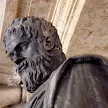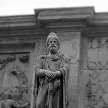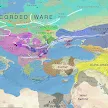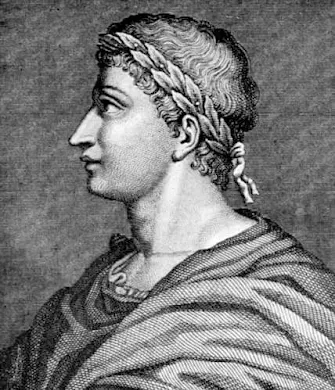Public
During emperor Trajan "Rome had a combined might of over 380,000 soldiers"
In that period Roman soldiers were payed 300 denari a year and a praemium of 3000 and a piece of good land at end of service. A tax for food and closing was subratcted. To that was added whatever they could get from the dead enemies on the battlefield, plundering of settlements and prisoners turned into slaves. One aureus (gold coin of 8 grams) = 25 denari (sliver coin of 4 gams)
Their salary food and closing could cost Rome a year
380000*300/25*8 = https://www.google.com/search?q=380000*300%2F25*8 that is 36 tons of gold.
Not taking in the account the higher ranks were payed much more, and whole the amount was probably double.
In that period Roman soldiers were payed 300 denari a year and a praemium of 3000 and a piece of good land at end of service. A tax for food and closing was subratcted. To that was added whatever they could get from the dead enemies on the battlefield, plundering of settlements and prisoners turned into slaves. One aureus (gold coin of 8 grams) = 25 denari (sliver coin of 4 gams)
Their salary food and closing could cost Rome a year
380000*300/25*8 = https://www.google.com/search?q=380000*300%2F25*8 that is 36 tons of gold.
Not taking in the account the higher ranks were payed much more, and whole the amount was probably double.
10
Shared publicly
Hide 4 comments
- How much gold were Romans getting from Dacia?
Dacia had the biggest gold reserves of world. Probably still has.
Besides the initial capture of the Dacia's treasure of about 200 tons, about 225 tons a year for 169 years.
"700 million Denarii per annum"
25 denari = 1 aureus or 8 grams of pure gold
700000000/25*8 = https://www.google.com/search?q=700000000%2F25*8REPLY 36w - In a world where the founder of an European catholic state having the capital named Buda is canonized (by Pope Gregory VII) no wonder one of the most important testimony about the conquest of Dacia, most important in Rome's history, written by emperor Trajan himself and all the copies are lost probably after Vatican took over Rome's archives. There is nothing about Dacia or its language written by Romans or others that has survived to this day except a few phrases mostly quotes.
https://en.wikipedia.org/wiki/Stephen_I_of_Hungary
REPLY 36w - "None of his works seem to be extant [surviving], except a few fragments preserved by other authors."
REPLY 36w - "Sucian Alps" is a rare surviving phrase about a toponimia in Dacian language. The word sucian contains the root suci (pronounced like in Latin or Italian) which seems Sanskrit meaning something like a (pine) needle. The surviving word in Romania is suci, which means to spin (a thread of wool or other textile fiber) and Suceava, a major city and mountainous county (where i was born) and a river.
It is thought by Romanian linguists that ava is a common suffix for names of places in Dacian. (again ava means away in Sanskrit hence the word Avalon in English).
https://www.google.com/search?q=%22sucian+alps%22
There are numerous other Sanskrit words in today's Romanian perhaps more than 50% of the language including the name Dacia itself (दक्ष् - daKs [Kyoto-Harvard] which means dexterous) which suggest Dacian language was similar to Sanskrit or maybe PIE (Proto Indo European).
Here is a modest attempt by me to build a list with most important ones.
REPLY 34w - "Strabo describes the Getae and Dacians as distinct but cognate tribes, but also states that they spoke the same language."
"The Roman poet Ovid, during his long exile in Tomis, is asserted to have written poetry (now lost) in the Getic language."
(Ovid was exiled in Tomis, a Greek colony, today Constanța, Romania.)
First Indo-European migration from its origin was towards Dacia. As i said above, Romanian is more than half populated with words that appear to be Sanskrit. It appears Dacian culture started with that first Indo-European migration which occurred around year -3100. Sanskrit in India was first written in -1500 during or after Arian invasion.
https://en.wikipedia.org/wiki/File:Indo-European_migrations.gif
"When Lysimachus tried to subdue the Getae he was defeated by them. The Getae king, Dromichaetes, took him prisoner but he treated him well and convinced Lysimachus there is more to gain as an ally than as an enemy of the Getae and released him."
In today's Romanian the word Getae (sans.जात jAta) survived as ceată, plural cete, which means group of people. Same word was at origin of Latin gens, French gens, English gens, Italian gente.
Ovid didn't know his exile was among his ancestors. But he could learn the language at a level to write poetry. Which can mean several things. He had a social and cultural life during his exile. The languages, Getic or Dacian and Latin were related.
https://en.wikipedia.org/wiki/Getae#Culture
REPLY 35w - 35w
- Old Casino which now is in
ruintotal neglect still remains the most recognizable landmark in Constanța.
https://www.google.com/search?q=constanta+romania&source=lnms&tbm=isch#imgrc=YGODf3SaxyFRpM:REPLY 35w - 35w
REPLY 35w



